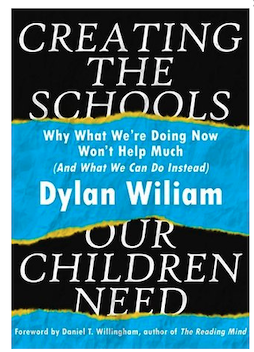“The overarching theme that came out of the first two thirds of the book was a reminder that teaching and learning are complex and, like any complex system, when you tweak one element, the effects ripple in often unpredictable ways.“

Not surprisingly Wiliam’s key advice to those with the pursestrings in education is to invest in teachers and particularly in improving their abilities to use formative assessment. For those who’ve read anything else by Wiliam, this isn’t going to be new. What is new and well worth reading are the chapters leading up to this conclusion. Wiliam carefully and systematically works his way through the many other possibilities for investing in school improvement and explains why either they don’t work or they aren’t cost effective or we don’t have good evidence.
The overarching theme that came out of the first two thirds of the book was a reminder that teaching and learning are complex and, like any complex system, when you tweak one element, the effects ripple in often unpredictable ways. Treating education as some kind of linear machine where turning a dial will have a predictable result is simplistic and silly and yet we still continue to do it.
Human learning is probably the most complex system that has ever existed in our universe and yet those outside the profession continue to treat it as though it is a sausage machine. The single most complex mechanism we have for engaging in this system is a professional teacher and Dylan Wiliam reminders us that investing in teachers and supporting them to become increasingly professional is the cleverest thing we can do. More complex and able than a single teacher is a collaboration between teachers and more powerful than that would be a professional collaboration between teachers and the community.
We are, after all, all part of the evolution of learning that creates our culture. Wiliam’s book provides a lot of carefully considered evidence to help us do a better job as a profession and as a community.
Note: This review was originally published in 2018 in Ian’s personal blog ‘alternative carparks‘. Please visit his blog for more articles, reviews, poems, musings and great insights into many things in life.
Bibliography
Wiliam, Dylan. Creating the Schools Our Children Need: Why What We’re Doing Now Won’t Help Much (and What We Can Do Instead). Learning Sciences International, 2018.
Ian Tymms, BA (Hons), Dip Ed, M.Ed teaches Middle School English and High School Theory of Knowledge at The United World College of South East Asia in Singapore. He has been involved in the UWCSEA Curriculum Articulation Project and in the adoption of the “Workshop” approach to teaching literacy in the Middle School at East.
Ian grew up in Australia and studied English literature and Psychology at Melbourne University, with postgraduate studies at The University of Tasmania and Deakin University. Ian’s Masters research focussed on school cultures.
At the end of Grade 12, Ian was offered a scholarship to complete a 32 day Outward Bound course and he went on to work for Outward Bound Australia as an instructor. From this experience, Ian has retained a lifelong interest in Outdoor Education and Hahnian ideals. Ian has a passion for the outdoors and spends many of his holidays hiking in Austria or sailing in Australia with his wife, Sharon, and their two children.

